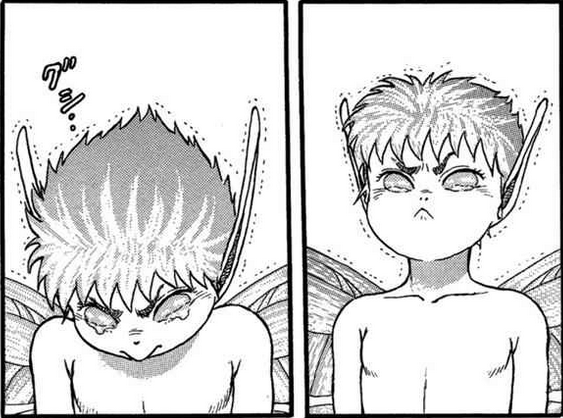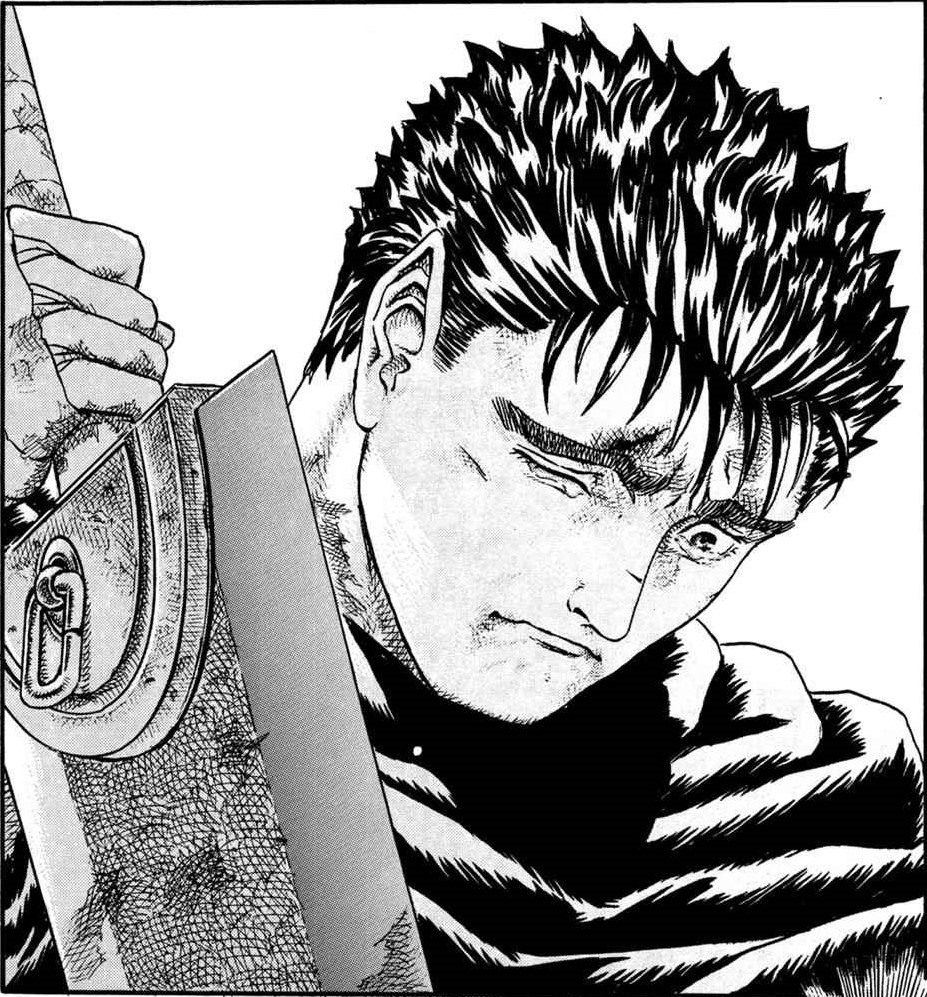In the beginning of August, I decided I would finally try and tackle Berserk, by Kentaro Miura. This page is dedicated to my progress in the series, where I will give my thoughts on it as I go on.
Currently On: The Golden Age: Part I
First Chapters
So far, I must say, I LOVE PUCK! Puck is such an adorable character, and my heart melts whenever I see him. His character design is just really cute, and it is funny how much he contrasts with the very violent world around him, and that is probably the purpose of it, to give a little light to the darkness of the series. Overall, you can definitely tell this was the earliest works of Miura, as sometimes the edginess comes off as immature. It is hard to explain, but I understand that as it goes on, the series becomes much more refined, as does Guts. The art itself is wonderful, even early on in the series. The violence as Guts cleaves through his foes with his hunk of metal he calls a sword is satisfying. I haven't gotten that far, so I'll save further input for later on.

I have finished the first real major arc of the Berserk series, "The Guardians of Desire". Here, we are introduced to many ideas which will come to be major aspects of the series in the future. Of note are the ghostly fetus that appeared to Guts when he was thrown into the dungeon, and, of course, Griffith, or Femto. So far, not much is explained about who Griffith is, but it is made clear that something deeply scarring happened in the past, to cause Guts to be so self-destructively angered at Griffith. It is also implied that the betrayal happened less than seven years ago, as shown by the God Hand being vacant of Femto in a flashback seven years ago. The rules of the God Hand so far are rather vague, as they are shown to be god-like, yet seem to have limited power, as the concept of fate is beyond the God Hand. While the God Hand can tempt, they cannot force people to their will. This is an important narrative theme, as this likely means that not only every member of the God Hand wished to be so, but every apostle is the same way. Apostles are not forced to be apostles, they choose to be the wretched beasts. In this case, our primary antagonistic apostle discovered that his wife was a pagan worshipper behind his back. Being a man of intense fervour and zealotry, upon discovering this by finding his wife partaking in a satanic ritual, he massacres everyone but her. Driven to the brinks of madness, the good leader is tempted by the mysterious object we are introduced to; a behelit. Through this artefact, he sacrifices his beloved, his wife, to become an apostle. The temptation does not come when one is experiencing a stable or happy existence. The temptation comes when one's entire life is upturned, when one loses everything. Well, everything except one thing, the thing they love the most, for it is the thing someone loves the most which must be the sacrifice to become an apostle. At the end of the final chapter, the count is offered to be born again if he performs another sacrifice; if he sacrifices his daughter. This moment relays some important information, that being the brand of sacrifice. This indicates that Guts was previously a sacrifice, but survived the process. From this information, a connection can be established that Guts might have been the sacrifice required for Griffith to "ascend". In a moment of defying temptation, the count refused to sacrifice his daughter, and surrendered to the spirits of hell, which dragged him to the depths of the underworld. Upon returning to the material plane, the count's daughter, Theresia, blames all of the events on Guts. Everything bad happened only when Guts appeared, and Theresia vowed she would kill Guts. Guts scoffs at this, turns his back, and walks away, seemingly with an air of confidence and disinterest. However, when Puck looks at Guts' face, he is surprised by what he sees. Guts is visibly sad, almost defeated. Guts has defeated the cruel Count, and has killed another apostle, but at what cost? I imagine this will continue to be a running theme throughout much of Berserk.
